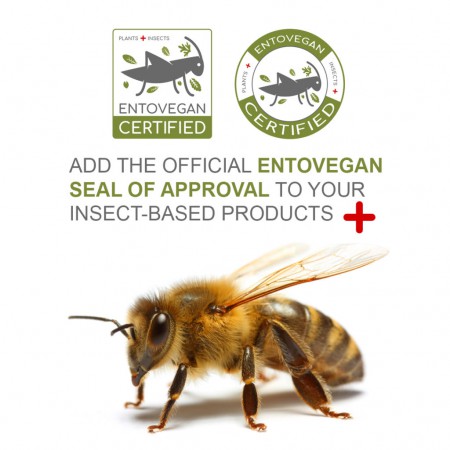Plant-based vegan is good, but Entovegan is better, and for me that’s really what it came down to. The nutritional deficiencies which vegans need to supplement, including vitamin B12, minerals including calcium, iron, zinc, and more, are fixed by adding insects to the diet.
Additionally, insects are a complete protein, with all essential amino acids and a full omega profile, along with being high in prebiotic fiber which has been shown to benefit a healthy gut microbiome.
Finally, the plant-based vegan diet recommendations for protein intake on a daily basis are meant to allow you to survive – but Entovegan helps you thrive! It’s really difficult to get enough protein to build muscle and improve athletic performance as a strict vegan, because the recommended 50-70g per day is just not enough. With insect powder though, and insect snacks, it’s possible to easily increase my protein intake to the 150g+ needed to get #entogainz and maximize my athletic performance!
What are the benefits you’re having following this diet?
I feel great, I’m healthier and stronger than I have been in years, I have improved energy and mental clarity, and as I mentioned above, I have been seeing remarkable improvements in the gym since I increased the amount of insect nutrition in my diet.
I also feel like I’m doing my individual part to make a difference, however small it may be, toward sustainability. I am already quite eco-friendly as it is, biking everywhere, using very little electricity, cold water showers, avoiding single-use plastic whenever possible, recycling, etc.
But with this diet, buying locally sourced insects, fruits, and veggies, and with zero meat, fish, dairy, or egg products at all, eating Entovegan is probably making more of a positive impact in terms of my carbon footprint than all the others combined! So I think that’s a benefit too, for myself and for others, by doing my part for the planet.
There’s plenty of work to be done in Cambodia to build the farming industry, too, so any companies interested in helping with rural smallhold farm development should consider joining AFFIA and the regional SE Asian cricket task force within the association and help out!
The idea is that companies will earn it by creating sustainable and nutritious products, and demonstrating this in a verifiable way. The goal is to inspire companies to be better – right now the industry is incredibly opaque, everyone is very secretive, pricing has a huge range without any real reason for it, etc.
I believe this is stunting the growth of the industry due to regulators who can’t get access to precise sustainability data (ie, proof that insects truly are making a positive impact towards Sustainable Development Goals) and due to confused consumers who already have enough of a challenge in front of them to just accept insects as food, but then are seeing a lot of disparity in nutritional claims and a wide range of prices (sometimes extremely high) without substantiation.
Consumers today are much smarter and better educated than before. I consider myself an early adopter, and as such when I hear things like “crickets have 1000x less greenhouse gas emissions” or “crickets use 100x less water”, well, show me the data. And I think that’s going to be vitally important for the industry as a whole to demonstrate that it truly is exponentially more sustainable than anything else out there.
I do believe it is – but we all need to do our part to prove this to the world, and that means verifiable sustainability data. Other industries are doing it, so should insects as food and feed. And if I can do a small part to be a catalyst for moving things in that direction, I want to do that.
Ultimately, though, I’ve also realized that I cannot in good conscience simply promote all insect products without A) ensuring that they’re actually sustainable, through whatever means available right now and B) making sure they don’t contain dairy, eggs, or other non-insect animal ingredients, since that’s the core of my dietary framework with Entovegan. And unfortunately, some products which I like, I realized do use whey or egg or soy.
Again, I want to mention that I do not want to disparage any insect product, I am the industry’s biggest supporter, from the biggest company to the smallest individual farmer! But I also need to make sure in the interest of integrity, that what I actively promote to the world, fits the ethos and diet which I am publicly claiming.
So Entovegan Certified is a way for me to ensure I’m doing right by my own stated guidelines, and also hopefully will inspire companies to be the best they can be and transparently show their results to consumers.
As I mentioned above, there will be no cost for the Entovegan Certified label (which can be adopted for use on packaging and online), but it will simply be earned by companies willing to show leadership in the industry, and hold themselves accountable to the highest standards of transparency with sustainability data and product ingredients.
Of course, it’s likely going to be a considerable amount of work for me to figure out with brands, so my plan to monetize the certification is at the moment through sales and distribution of the products which meet the highest standards, and are thus qualified to be Entovegan Certified.
“How will it work” is a question I’ve gotten, and that’s an important one. Ingredients and nutrition I think is fairly simple and clear. Independent lab test results are required for import regulators in many countries, so I don’t think it’s too much to ask as a consumer to be able to see verified test results of what’s in the product I’m buying. That’s not proprietary – the package label says it’s XX% protein? Show me the lab test. Simple.
Sustainability is a bit more complex, and will be a process that evolves over time, I’m sure. The crux of a sustainable supply chain is to do what lasts, while recognizing the limits of environmental and social resources.
The question is, are insect products actually as sustainable as we all claim they are? And can consumers trace the products they’re buying back to the source?
Organizations like Ento Trust and initial guidelines from IPIFF (which are being adapted for other regions by AFFIA, IPAA, NACIA, et al) are setting out to rectify this, which is great. But I believe companies can also do it themselves, and that’s at the heart of this initiative.
What’s your forecast for the future of this industry Worldwide?
I’m very optimistic for insects as food and feed, despite the current growth challenges we face, which I think is normal for a nascent industry. I’ve essentially focused my entire life into this space the past several years and will continue to do that, hopefully increasing what I’m able to accomplish on my mission to bring the world’s most sustainable superfood to the masses!
I do think it’s important to be realistic and honest, though. For example, the research reports about the industry sold online are not in any way accurate – and this is a problem because the mainstream media quotes them and then everyone just believes it, without looking deeper.
The reason it’s a problem is because the CAGR is incredibly high, and while the numbers in terms of the insects as food sector being worth billions (with a B) in 4 years are fun to dream about, if you look at the actual details those reports are basing this rosy outlook on, nearly all of it is completely made up!
Truly – claiming that companies which aren’t even in business anymore are “market leaders” in obscure countries with products that never existed in the first place, and that their annual revenue is in the tens of millions of dollars…multiply that by 86 pages of a global report and suddenly the industry is worth hundreds of millions and growing at 43% annually.
That’s not the case, and that’s dangerous for everyone involved – it burns startup founders, who think the path to success is faster and easier than the reality. It burns investors, who think capital will lead to the next growth round faster than it does. And it gives those who are established in the industry and dedicated to it for the long term, additional challenges which the industry as a whole doesn’t need right now.
Because instead of focusing on the true benefits of insects, which are the sustainability and nutritional benefits in both food and feed, everyone inside and outside the sector is looking at it like it’s the next gold rush or dot-com boom. Bad things happen with baseless projections – whether for a startup or an industry.
The reality, and what I see for the future, is that the industry will find a way over the next few years to clearly and inarguably demonstrate that farmed insects are the most sustainable protein source on the planet.
And as that happens, as insects are proven to be more environmentally friendly and a truly nutritious superfood / feed, then we’re going to start to see real adoption, real global acceptance, and real growth.
I’m very optimistic – but I also believe the road to true success for the industry as a whole is going to be bumpier than most people think it is, and that the faster we can (all of us!) demonstrate the data behind our claims of nutrition and sustainability, the faster the road to insects changing the world for the better will smooth out in front of us.






